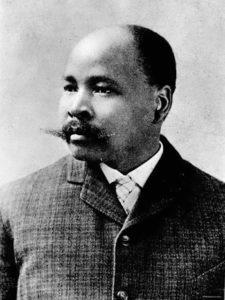
John Langalibalele Dube
*John Langalibalele Dube was born on this date in 1871. He was a Black South African activist, essayist, philosopher, educator, politician, publisher, editor, novelist, and poet.
John Langalibalele was born in Natal at the Inanda mission station of the American Zulu Mission (AZM), a branch of the American Board of Commissioners for Foreign Missions, whose Southern African mission churches later merged with sister Congregational mission churches of the London Missionary Society and Congregational Union of South Africa to form the United Congregational Church of Southern Africa (UCCSA). His father, the Rev. James Dube, was one of the first ordained African pastors of the AZM.
Young Dube began his formal education in Inanda and Adams College, Amanzimtoti. During that time, the Reverend William Cullen Wilcox was called in to talk to Dube, who was misbehaving at the Adams School. His father, James Dube, was then the Congregational minister at Inanda. In 1887, the Wilcox family was returning to the United States. John Dube and his mother persuaded the missionary couple to take young Dube to America, where he could further his education.
The Cullens agreed on the condition that Dube was to maintain himself financially; however, they advised him, and William found him his first work on the road gang when he arrived in America. Dube went to Oberlin Academy Preparatory School, and although he studied printing and self-help, he did not graduate. Dube was born of royal lineage and was, by right, chief of the Qadi tribe. Because of his father's conversion to Christianity by early missionaries in pre-republic South Africa, he did not rule over the Qadi people. Dube's surname was Ngcobo; they had the chieftaincy of the Qadi people of the Zulu.
He returned to South Africa, wherein in 1901, he founded the Inanda Seminary Institute for Girls at Ohlanga. He was among the pioneering men of letters who helped to establish Zulu literature. Also, in 1903 he married his first wife, Nokutela Dube. He was one of the first published Zulu authors. In addition to his literary works, Dube and his wife founded the first Zulu/English newspaper Ilanga laseNatali (The Sun of Natal), in 1903.
Dube's first published work was an essay in English on self-improvement and public decency, published in 1910. The work that was to earn him the honorary Doctor of Philosophy was the essay Umuntu Isita Sake Uqobo Lwake ("A man is his own worst enemy") (1992) (text in pre-1936 Zulu old orthography). He went on to publish a historical novella that has proven to be popular and influential in the Zulu canon titled Insila kaShaka ("Shaka's Body Servant") (1930).
Dube also began writing biographies of the Zulu royal family, especially that of King Dinizulu, making him the first biographer in African literature. Numerous other works of less significant literary quality, such as the essay Ukuziphatha [On Behaviour] (1910). Dube wrote and edited numerous editorials for the paper and under various pseudonyms, as well as publishing some indifferent poems. He nurtured journalists who later became editors of his paper and contributed to the flourishing field of Zulu literature.
Heavily influenced by Booker T. Washington, he also wanted Black people to go into business for themselves. He was the founding president of the South African Native National Congress (SANNC), which became the African National Congress in 1923. Dube served as the president of SANNC between 1912 and 1917. In 1930, John Dube published "Shaka's Body Servant." He also wrote about the lives of Zulu rulers, including King Dinizulu.
He was a conservative politician. His ANC was not a militant party of the 1960s, but he never lost sight of human rights and the need for Africans to stand together. That was the message John Langalibalele Dube was preaching until he died on his birthday in 1946.